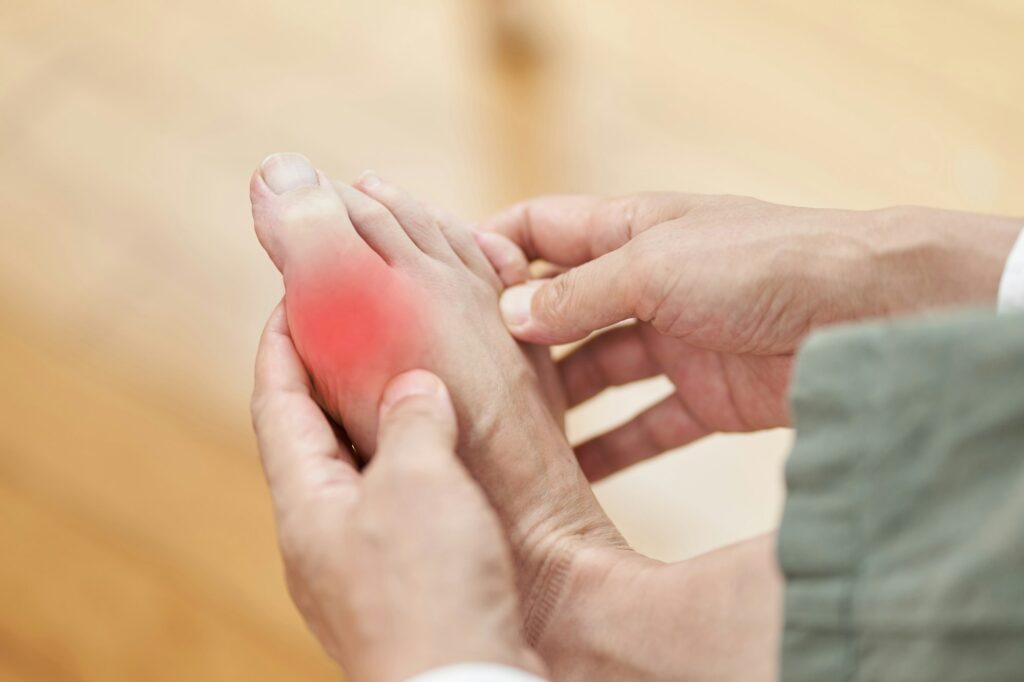What is Gout?
Gout is a common type of arthritis that most often affects the joint at the base of your big toe. While it is more common among those over 30, people of any age can suffer from this condition.
Gout is caused by an excess of uric acid in the blood. Normally, a slightly elevated level of uric acid is not harmful, but when the levels become too high, the acid may form hard crystals in the joint. This could cause severe burning pain, swelling and stiffness in the joint.
While gout can affect any joint, the most common place for it to strike is in in the big toe. While both men and women can be affected by gout, it is more common in men.
Attacks of gout come on suddenly and can be miserable, causing symptoms such as:
- Intense joint pain that occurs abruptly, often in the middle of the night or upon waking
- Lingering joint discomfort that lasts a few days to weeks after the most severe pain fades
- Inflammation, including redness, swelling, warmth, and tenderness
- Restricted range of motion
Without treatment, gout can lead to increased pain and joint damage. You should schedule an appointment with us right away if you experience sudden, intense joint pain.
What Causes Gout?
Deposits of crystallized uric acid lead to gout attacks. Normally, your body removes uric acid from your blood and eliminates it via urination. When you have gout, uric acid builds up and crystallizes in your joints.
Uric acid accumulates in people’s bodies for a variety of reasons. This substance is the result of the breakdown of purines, which are chemicals naturally found in your body and in certain food and beverages, such as red meat and beer.
In some cases, gout develops because the kidneys can’t effectively eliminate uric acid through urine. Other times, the body produces too much uric acid. Certain factors may increase your risk for gout, including:
- Having a family history of gout
- Certain diseases and conditions increase risk of gout, like high blood pressure diabetes, metabolic syndrome, heart disease and kidney disease.
- Eating a diet rich in certain foods and drinks, such as red meat, seafood, beer, and wine
- Drinking too much alcohol, especially beer.
- Being overweight.
- Drinks sweetened with fruit sugar (fructose) promote higher levels of uric acid
- Consuming excessive amounts of meat and fish that have a high content of Purines and other chemicals.
- Certain types of medications, especially prolonged use of diuretics.
- Recent trauma or surgery could trigger gout.
Gout commonly affects the big toe because uric acid crystallizes at cooler temperatures. Because your toe is the farthest from our heart, it’s cooler than the rest of your body.
Symptoms of Gout
Symptoms of gout almost always occur suddenly, and often at night. They include:
- A sudden attack of pain.
- Swelling, tenderness and redness of the big toe.
- Continuous ache under and around big toe.
- Stiffness of the toe.
The duration of the attacks can vary from a few days to a few weeks. Once the attack has passed there is no way of knowing when the next one will occur; it could be days, weeks months or even years.
How is Gout Diagnosed and Treated?
First, our Providers review your symptoms and medical history and examines the affected joint. You may need tests, such as blood work or an on-site digital X-ray, to confirm a diagnosis of gout.
Then, we will recommend the best treatment for your specific needs. Treatment for gout typically includes medications and lifestyle changes, such as limiting food and drinks high in purines.
If you experience symptoms of gout, call us or book an appointment online today.


